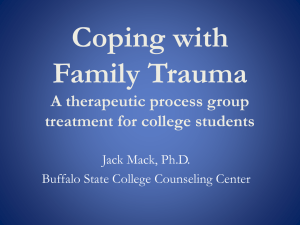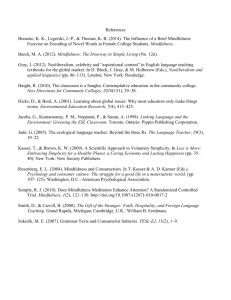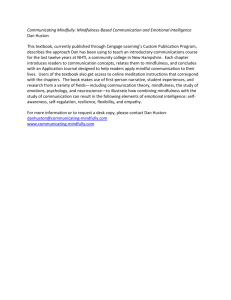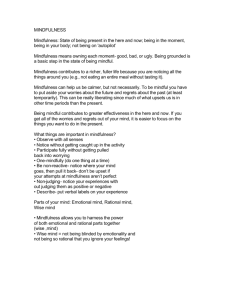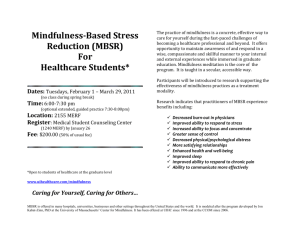The Mindful Path in Trauma Care
advertisement
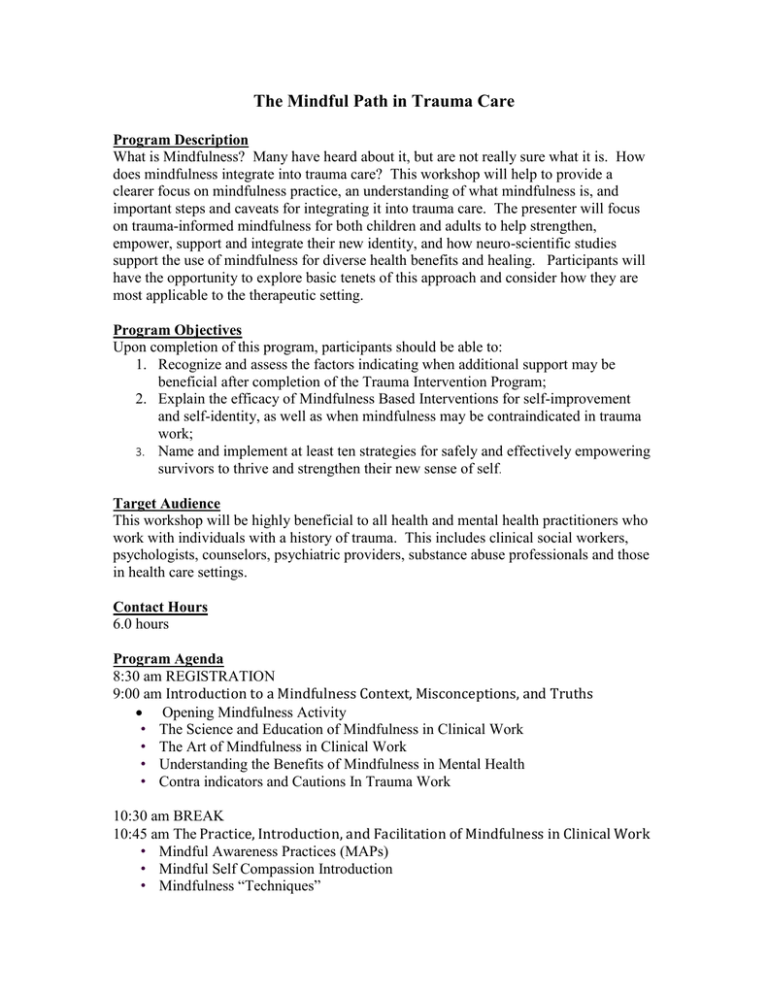
The Mindful Path in Trauma Care Program Description What is Mindfulness? Many have heard about it, but are not really sure what it is. How does mindfulness integrate into trauma care? This workshop will help to provide a clearer focus on mindfulness practice, an understanding of what mindfulness is, and important steps and caveats for integrating it into trauma care. The presenter will focus on trauma-informed mindfulness for both children and adults to help strengthen, empower, support and integrate their new identity, and how neuro-scientific studies support the use of mindfulness for diverse health benefits and healing. Participants will have the opportunity to explore basic tenets of this approach and consider how they are most applicable to the therapeutic setting. Program Objectives Upon completion of this program, participants should be able to: 1. Recognize and assess the factors indicating when additional support may be beneficial after completion of the Trauma Intervention Program; 2. Explain the efficacy of Mindfulness Based Interventions for self-improvement and self-identity, as well as when mindfulness may be contraindicated in trauma work; 3. Name and implement at least ten strategies for safely and effectively empowering survivors to thrive and strengthen their new sense of self. Target Audience This workshop will be highly beneficial to all health and mental health practitioners who work with individuals with a history of trauma. This includes clinical social workers, psychologists, counselors, psychiatric providers, substance abuse professionals and those in health care settings. Contact Hours 6.0 hours Program Agenda 8:30 am REGISTRATION 9:00 am Introduction to a Mindfulness Context, Misconceptions, and Truths Opening Mindfulness Activity • The Science and Education of Mindfulness in Clinical Work • The Art of Mindfulness in Clinical Work • Understanding the Benefits of Mindfulness in Mental Health • Contra indicators and Cautions In Trauma Work 10:30 am BREAK 10:45 am The Practice, Introduction, and Facilitation of Mindfulness in Clinical Work • Mindful Awareness Practices (MAPs) • Mindful Self Compassion Introduction • Mindfulness “Techniques” • Experiential Learning Activities 12:00 pm Lunch (on your own) 1:00 pm Introduction to Structured Mindfulness Programs • Advanced Clinical Techniques/Applications • Mindful Self-Compassion Approaches in Trauma Care • Clinical Interventions, Techniques and Experiential Examples 3:30 pm BREAK 3:45 Bridging Sensory Therapies with Mindfulness • Exploration of Mindfulness Based Cognitive Work in contrast to other Cognitive Therapies • Advanced Discussion and Application Activity to Personal and Professional Context • Closing Activity - Sensory Based Debrief 5:00 pm Adjournment Faculty Cherie L. Spehar, MSW, LCSW, is a Licensed Clinical Social Worker, Facilitator, Registered Play Therapist-Supervisor, and Certified Trauma Consultant-Supervisor in Apex, NC. A clinician since 1994, she has dedicated her life to the well-being and healing of children, women and families. With her extensive clinical background, her professional path has found her in longstanding roles such as Executive Director of The Child Abuse Prevention Center in Raleigh, North Carolina and Training Coordinator and Developer with the North Carolina State University Social Work Department. Ms. Spehar can be found at her private practice center, Smiling Spirit Pathways, where she has developed a haven for consultation, training, child and family therapy, and trauma services. There, she also develops children’s groups, facilitates workshops related to resiliency, “trauma parenting”, and women’s wellness and serves as a field instructor for UNC-CH, School of Social Work. Ms. Spehar is a Certified Trauma ConsultantSupervisor with The National Center for Trauma and Loss in Children (TLC) and has served hundreds of children and adults with TLC Programs. Additionally, she has pioneered efforts in her local and statewide school system to bring Trauma-Informed approaches into the educational setting and provides regular consultation to community agencies on Trauma-Informed Care. Ms. Spehar also provides presentations, Keynotes, and trainings locally and nationally on working with traumatized children and adults. She further specializes in Therapeutic Writing interventions and holds a Certificate of Advanced Study in this expressive therapy field. She has recently developed a Trauma Mentorship Program in which she accepts beginner and advanced candidates for intensive study in the use of trauma-informed interventions and approaches. 2
